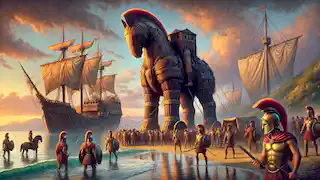The tale of the Trojan Horse is one of the most famous stories in Greek mythology. It weaves a complex narrative of war, deception, divine intervention, and human frailty. For ten long years, the Greeks laid siege to the mighty city of Troy. This was no ordinary war—it was a conflict sparked by love and lust, spurred on by pride and vengeance, and manipulated by the whims of the gods themselves. When brute force and endless bloodshed failed to breach Troy’s legendary walls, it was the cunning mind of Odysseus, one of Greece’s most revered heroes, that would ultimately bring the city to its knees.
Let us now embark on this journey, tracing the origins of the Trojan War, the fall of Troy, and the enduring legacy of the Trojan Horse. Long before the Greek ships set sail for the shores of Troy, the seeds of war had already been sown among the gods of Olympus. It began at the wedding feast of Peleus and Thetis, a mortal king and a sea nymph. All the gods had been invited to celebrate the union, except for Eris, the goddess of discord. Furious at the slight, Eris devised a plan to sow chaos among the immortals. During the feast, Eris tossed a golden apple into the crowd, inscribed with the words "To the fairest." Three goddesses—Hera, queen of the gods; Athena, goddess of wisdom and war; and Aphrodite, goddess of love and beauty—immediately laid claim to the apple. Unable to settle the dispute themselves, they sought out Zeus to make the decision. Zeus, knowing that any choice he made would bring the wrath of the other two goddesses upon him, cleverly passed the task to a mortal: Paris, prince of Troy. He chose Paris not just because of his beauty, but because he was the son of King Priam of Troy, a city that had long been favored by the gods. The three goddesses appeared before Paris, each offering him a bribe in exchange for choosing her as the fairest. Hera promised him power and dominion over all of Asia. Athena offered him unmatched wisdom and skill in battle. But it was Aphrodite who tempted Paris with the most irresistible gift of all—she promised him the love of the most beautiful woman in the world: Helen of Sparta. Helen was the wife of Menelaus, king of Sparta, and her beauty was renowned throughout the lands. Paris, seduced by the prospect of having Helen as his own, awarded the golden apple to Aphrodite. In doing so, he earned the eternal enmity of both Hera and Athena, who would become steadfast enemies of Troy during the war that followed. With Aphrodite’s aid, Paris traveled to Sparta, where he was welcomed as a guest in the palace of Menelaus. But Paris’s heart was set on Helen, and during Menelaus's absence, he seduced her and fled back to Troy with her as his prize. This act of betrayal and abduction sparked outrage across Greece. Menelaus called upon his brother Agamemnon, king of Mycenae, and together they summoned the kings and warriors of Greece to sail to Troy and reclaim Helen. Thus, the Trojan War began—a war that would rage for ten long years and see the involvement of many of the greatest heroes of the age. The Greeks answered the call to arms with fervor. Agamemnon, as the commander of the coalition, mustered an immense fleet of over a thousand ships from all corners of the Greek world. Among the leaders were the greatest names of the age: Achilles, the nearly invincible son of the sea nymph Thetis; Odysseus, the clever king of Ithaca; Ajax, the towering and stalwart warrior; and Diomedes, the courageous and fearsome fighter. The fleet was vast, stretching as far as the eye could see. Their destination: the distant and prosperous city of Troy, situated near the coast of Asia Minor. Troy was a city protected by mighty walls, said to have been constructed by the gods Apollo and Poseidon. These walls made Troy nearly impregnable to any direct assault. When the Greeks arrived at the shores of Troy, they were met by an army led by Hector, the noble prince of Troy and its greatest warrior. The Greeks immediately set up a fortified camp on the beach and prepared for a protracted siege. Though the Trojans fought valiantly, they could not drive the Greeks back into the sea, and the siege dragged on year after year. The gods themselves were divided in their loyalties. Aphrodite, Apollo, and Ares supported the Trojans, while Hera, Athena, and Poseidon aided the Greeks. Their interference was both a blessing and a curse for the mortals, as the gods frequently manipulated events to further their own agendas. The war was not merely a series of battles; it was also a clash of the greatest heroes of the age. Achilles became the Greeks' greatest weapon, slaughtering countless Trojans and winning glory on the battlefield. His rage and prowess were unmatched, but his pride and arrogance often led to strife within the Greek camp. When Agamemnon insulted Achilles by taking away his prized concubine Briseis, Achilles withdrew from the battle in a fit of anger, refusing to fight. This decision would have dire consequences for both sides. As the war continued without Achilles, the Greeks found themselves struggling to hold their ground against the Trojans. Hector, the shining hope of Troy, led daring raids against the Greek forces, pushing them back toward their ships. The Trojans, once content to remain behind their walls, now began to take the fight to the Greeks. But the gods, ever meddlesome, had plans for both Achilles and Hector. With Achilles still absent from the battlefield, his closest friend and comrade, Patroclus, could not bear to see the Greeks suffer any longer. Donning Achilles’ armor, Patroclus led the Myrmidons into battle, driving the Trojans back and giving the Greeks a much-needed reprieve. However, Hector, mistaking Patroclus for Achilles, confronted him in single combat and killed him. It was only after removing the armor from his fallen foe that Hector realized he had slain not Achilles, but his dear friend. This act would seal Hector's fate, for when news of Patroclus' death reached Achilles, his grief turned to wrath. Achilles, consumed by rage and sorrow, returned to the battlefield with a single purpose: to avenge Patroclus by killing Hector. The two heroes met outside the walls of Troy in a duel that would become legendary. Despite Hector’s bravery and skill, he was no match for the fury of Achilles. Achilles struck him down and, in a fit of vengeful madness, desecrated Hector’s body by dragging it behind his chariot around the walls of Troy. The gods intervened once more, and it was only through the pleading of King Priam, Hector’s father, that Achilles was convinced to return Hector’s body to the Trojans for a proper burial. The death of Hector was a devastating blow to Troy, for he had been their greatest defender. Yet even as Achilles mourned Patroclus and Hector was laid to rest, the war showed no signs of ending. The Greeks, still unable to breach Troy’s walls, continued their siege, while the Trojans, though weakened, refused to surrender. As the years dragged on, the Greeks grew desperate. Their supplies dwindled, their morale was low, and their numbers were thinning. They had tried every tactic they could think of, from direct assaults to cunning ambushes, but Troy’s walls held strong. It was at this moment, when all hope seemed lost, that Odysseus, the shrewdest of the Greek kings, devised a plan so audacious that it would change the course of the war. Odysseus knew that brute force alone would never bring down Troy. The city’s defenses were too formidable, and its people too resolute. What was needed was a strategy that would exploit the Trojans’ pride and sense of invincibility. The idea came to him in a moment of inspiration: the Greeks would pretend to abandon the siege, leaving behind a massive wooden horse as a supposed offering to the gods. The horse would be hollow, large enough to conceal a group of elite Greek warriors inside. While the Trojans celebrated their apparent victory and brought the horse into the city, the Greeks hidden inside would wait until nightfall, then emerge from the horse and open the gates to allow the rest of the Greek army, which would be secretly waiting nearby, to storm the city. It was a plan that relied not on strength, but on deception and timing. Odysseus presented his idea to Agamemnon, who agreed to it with great reluctance. The Greeks immediately set to work constructing the giant wooden horse, which would later become one of the most famous symbols of trickery in history. The horse was built tall and imposing, its body crafted from the finest wood available. Carved with images of gods and heroes, it was designed to evoke awe and reverence in those who beheld it. Epeius, a skilled craftsman, was entrusted with the task of constructing it, and under his direction, the horse took shape in a matter of days. Once the horse was completed, the next phase of the plan began. The Greeks burned their tents, destroyed their fortifications, and made it appear as though they were sailing away from Troy, abandoning the siege. They left behind only a small group of men, including Sinon, a Greek soldier who had been instructed to play the role of a deserter and convince the Trojans that the Greeks had truly gone. At sunrise, the Trojans awoke to a strange sight. The vast Greek camp that had plagued them for a decade was gone. Only the charred remains of the tents and the massive wooden horse remained on the battlefield. Bewildered and cautious, the Trojans emerged from the safety of their walls and approached the horse. It was an imposing figure, towering above them, yet it appeared harmless—an offering, perhaps, to the gods. King Priam, his advisors, and the citizens of Troy gathered around it, debating what to do. Laocoön, the high priest of Troy, was one of the few who urged caution. “Beware of Greeks bearing gifts,” he warned, suspecting treachery. In a bid to prove his point, Laocoön hurled a spear at the horse, striking its side with a resonant thud. The Trojans hesitated, but the sight of Sinon, a supposed Greek deserter, lent credence to the story of Greek retreat. Sinon approached the Trojans and spun a tale of Greek betrayal, claiming that the horse was an offering to Athena to ensure their safe departure. If the Trojans brought it into their city, he insisted, they would win the favor of the goddess. The Trojans were divided. Some, still cautious, agreed with Laocoön’s warnings. But others, including Priam’s sons, argued in favor of bringing the horse into the city. They saw it as a symbol of their victory, a final proof that the Greeks had fled in defeat. After much debate, Priam made the fateful decision to bring the horse within Troy’s walls. That night, the Trojans celebrated. They feasted and drank in the streets, rejoicing in the belief that their long siege was over, and they had emerged victorious. The giant wooden horse stood proudly in the city’s main square, a testament to what they believed was their indomitable strength. As the Trojans reveled in their supposed triumph, they had no idea that their doom was sealed. Inside the wooden horse, Odysseus and his elite warriors waited in silence, cramped in the darkness. Outside the city, the Greek fleet, which had only pretended to sail away, lay hidden in the nearby cove, waiting for the signal. At midnight, when the city was at its most vulnerable, Sinon lit a signal fire, alerting the Greek ships that the time had come. Quietly, the fleet returned to the shores of Troy. Inside the city, Sinon approached the wooden horse and opened a hidden compartment, allowing the Greek warriors to emerge from their hiding place. Odysseus led his men through the sleeping streets of Troy, swiftly killing the guards stationed at the gates. With the gates unbarred, the rest of the Greek army poured into the city, their swords drawn and torches blazing. By the time the Trojans realized what was happening, it was too late. The city was engulfed in flames, and the Greeks showed no mercy as they cut down every Trojan in their path. Houses were torched, and temples were desecrated. The once-proud walls of Troy crumbled under the onslaught. King Priam, in his final moments, took refuge in the temple of Zeus, but even the sanctity of the gods could not save him. He was brutally slain by Neoptolemus, the son of Achilles. Aeneas, one of the few Trojan heroes to survive the night, fled the city with his family, guided by the gods to seek a new destiny elsewhere. His escape would later be immortalized in Virgil’s epic, “The Aeneid,” as the beginning of the founding of Rome. As dawn broke over the smoldering ruins of Troy, the Greeks stood victorious. The city that had withstood ten years of siege was no more. Its people were either dead or enslaved, and its walls lay in ruin. The Trojan War had ended, but at an unimaginable cost to both sides. After the fall of Troy, the Greeks divided the spoils of war among themselves. Helen, whose beauty had been the catalyst for the war, was reclaimed by Menelaus. Legend tells of the moment when Menelaus finally laid eyes on Helen after the fall of the city. His rage, which had burned for so many years, began to falter in the presence of her unmatched beauty. Though many expected him to kill her for her betrayal, Menelaus was unable to carry out the deed. Instead, Helen returned with Menelaus to Sparta, her fate intertwined with the memory of the war that had ravaged Greece and Troy alike. Some say that Helen lived out her days in peace, restored to her position as queen, while others believe that she was shunned for her role in the destruction of Troy. As for the Greeks, their victory came at a heavy price. The gods, displeased by the brutality of the sack of Troy, cursed many of the Greek heroes. Agamemnon, upon returning home, was murdered by his wife Clytemnestra in revenge for the sacrifice of their daughter Iphigenia. Odysseus, though victorious, would face years of trials and hardships on his journey home, as chronicled in Homer’s “Odyssey.” The story of the Trojan Horse became a powerful symbol in Greek mythology, representing both the ingenuity of Odysseus and the devastating consequences of deception. The phrase “Trojan Horse” has since become synonymous with any act of treachery or hidden danger. It serves as a reminder that even the mightiest fortresses can fall, not to force, but to cleverness and trickery. The legend of Troy would continue to inspire poets, playwrights, and historians for centuries. The city, though fallen, became immortalized through its stories, a reminder of the hubris of men and the power of the gods. The Trojan War, with its blend of heroism, tragedy, and divine intervention, would stand as one of the greatest epics in human history. The tale of the Trojan Horse is one of the most enduring stories from ancient Greece. It is a tale that speaks to the complexities of war and the fragility of human nature. Through cunning and deception, the Greeks achieved what brute force alone could not: the fall of Troy. But in their victory, they also suffered great loss, as the gods punished them for their excesses and pride. The Trojan Horse, a symbol of both human ingenuity and the perils of overconfidence, remains a powerful metaphor even today. It reminds us that sometimes, the greatest threats are not the ones we can see, but the ones hidden beneath the surface, waiting for the right moment to strike.The Divine Prelude and the Judgement of Paris
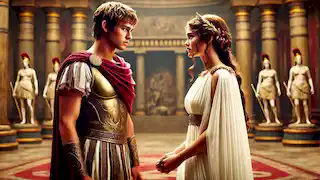
The Gathering of the Greek Armies and the Arrival at Troy
The Tragedy of Achilles and Hector
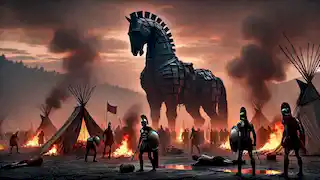
The Cunning of Odysseus
The Trojans’ Fateful Decision
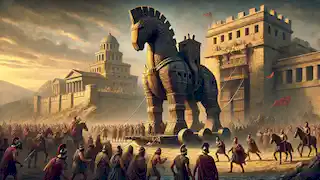
The Fall of Troy
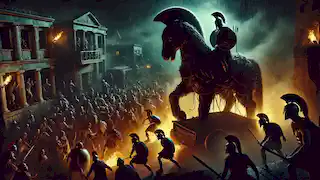
The Return of the Greeks and the Fate of Helen
The Enduring Legacy of the Trojan Horse

Conclusion
